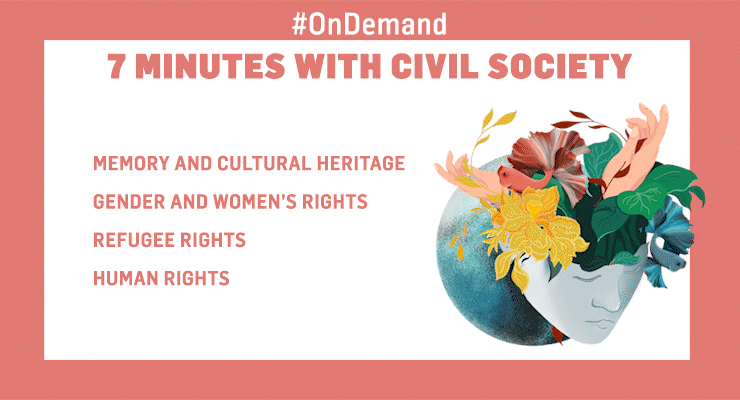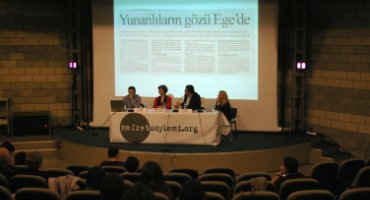The Festival of Co-Existence was held on July 2-3, 2022 at Lütfi Kırdar Congress Center in which civil society organizations, rights defenders, activists, academics, students and everyone who is interested in civil society got together.
There were panels to promote national and international experience sharing and transfer of knowledge in which more than 400 people were registered; creative workshops with a particular focus on co-existence and human rights for adults, youth and children; 34 stands of different civil society organizations all around Turkey for strengthening the communication between civil society organizations and for them to reach out to a wider audience; and live concerts.
Institutions and experts working on the field of human rights, refugees, gender, ecology, cultural heritage, art and various fields participated in our festival organized in cooperation with Truth, Justice, Memory Center.
You can watch the videos of the panel series in which civil society professionals from America, Argentina, Germany, South Africa, India, Canada, Northern Ireland, Hungary, Sri Lanka, Turkey and Uganda participated as speakers by pressing the "play" icon.
10.30 - 11.00
Marmara Venue
Ayşe Köse Badur- Istanbul Policy Center
Helin Şahin - Olof Palme International Center
Murat Çelikkan - Hakikat Adalet Hafıza Merkezi
Alexander Fricke - Delegation of European Union to Turkey
Civil society organizations, rights defenders, activists, academics, and everyone who wants to be a part of the civil society from Turkey and abroad are meetıng at the Festival of Co-existence. This festival is part of our Empowering Civil Society Organizations Project, carried out in cooperation with the Istanbul Policy Center and Olof Palme International Center, with financial support from the European Union since 2019.
At the festival, organized in cooperation with Hafıza Merkezi, Prof. Dr. Ayşe Soysal representing Hrant Dink Foundation, Senem Aydın Düzgit representing IPC, Helin Şahin representing Hafıza Merkezi, Murat Çelikkan representing Hakikat Adalet Hafıza Merkezi and Alexander Fricke representing the EU Turkey Delegation, gave the opening speeches.
11.00 - 12.00
Marmara Venue
İbrahim Betil - Civil society volunteer
Olcay Özer - Hafıza Merkezi
Dilek Ertükel - Sivil Düşün
Five main headings stand out in the annual report of CIVICUS on the situation of civil society on a global scale. These were determined as the fight against racism, human rights, environmental justice, income justice and democracy demands after the pandemic. We talked about the importance of the political, social and economic developments that cause these demands for civil society, their impact on civil society and how civil society struggles with this situation by going through the topics mentioned in the session. Participants also shared their predictions for the near future regarding civil society.
13.30 - 14.30
Marmara Venue
Katie Kruger - Atlas Relief & Development International
Jon Greenberg - Polifact (Poynter Institute)
Doç. Dr. Tirşe Erbaysal Filibeli - Bahçeşehir University
This session focused on the recently increasing hate speech and manipulative news in the media against refugees and migrants. We analyzed why hate speech and discriminatory news are on the rise and the methods of fact-checking through examples from Turkey and abroad. There was also a discussion on the relationship between fake news and hate speech through news targeting refugees.
15.00 - 16.00
Marmara Venue
Liana Varon - Support for Civil Society Foundation
Birce Altay - Third Sector Foundation of Turkey
Jenny Hodgson - Global Fund for Community Foundation
Tezcan Eralp Abay - Civil Society Development Center (CSDC)
This session focused on the philanthropic perception toward rights-oriented institutions, how grant processes can be designed by getting to know civil society better, the methods applied by funding institutions in the “shrinking” areas of civil society, and the changes in the donation culture after the pandemic.
16.30 - 17.30
Marmara Venue
Avila Kilmurray - the Social Change Initiative
Atalay Göçer - Cultural Research Center for Peace
At this session the panelists discussed peace processes and the impact of women’s and LGBTI+ movements on them in the context of recent political conflicts in Turkey and Northern Ireland, by looking at similarities and differences.
12.00 - 13.00
Dolmabahçe C Venue
Feray Halil - Allianz Kulturstiftung
Esra Aysun - British Council
Rumeysa Kiger - Cultural Entrepreneur
At this session, starting from the question of why it is important to promote coexistence at these times, the main focus was on the role of the culture-arts sector while searching for answers, and how the culture-arts plays a role in ensuring intercultural dialogue and cultural pluralism.
13.30 - 14.30
Dolmabahçe C Venue
İlksen Mavituna - Moderator
Dr. Çağdaş Dedeoğlu - Post-human Lab
Artificial intelligence has started to be used in civil as well as in many areas. The enlargement of the field also opened up various areas of discussion. Artificial intelligence ethics is one of the topics that concern civil society. In this session, we made a general assessment of the learning styles of artificial intelligence, how and where it gets data. We talked about how the ethics of artificial intelligence and discussions on this issue affect human rights, how non-governmental organizations can use artificial intelligence in addition to the difficulties in terms of human rights, the present and future of artificial intelligence within the framework of ethics and human rights.
15.00 - 16.00
Dolmabahçe C Venue
Pankaj Anand - OXFAM
Tülin Hadi - İstanbul Kent Konseyi
Perihan Uluğ - Foundation for the Support of Women's Work
By focusing on the urgency of creating a more equal and sustainable world, we discussed poverty as a human rights violation, taking into consideration the current situation both in Turkey and India, along with the overall assessment of poverty and social inequality in the world. We discussed it as a violation. We talked about the work done in civil society to make deep poverty visible, and we talked about the limits of civil society's work and the transformative policies that can be developed in this regard.
Feminist activist Ishtar Lakhani, who was selected for the BBC's "Top 100 Women of 2020" list by playing an important role in the campaign for free COVID-19 vaccines last year, shared her experience on creative forms of activism in this session. Beyond the well-known civil society campaigns, to strengthen approaches to human rights advocacy from different perspectives how she can look by combining art and activism.
11.00 - 12.00
Marmara Venue
Eylem Delikanlı - Research Institute on Turkey
Aylin Tekiner - Research Institute on Turkey
Aylin Vartanyan - Boğaziçi University
Nevin Soyukaya - Diyarbakır Association for the Protection of Cultural and Natural Assets
At this panel, the discussion was on the contribution of collective memory to co-existence, how memory studies can transform human rights in the historical context, and what kind of a role can collective memory and the past and present injustices play in shaping the public narratives.
13.00 - 14.00
Marmara Venue
Zsolt Szekeres - Hungarian Helsinki Committee
Gastón Chillier - The International Network of Civil Liberties
This session invited us to consider what we can learn from human rights movements in struggling for inequality and justice in Latin America and Eastern Europe. The discussion was on how civil society organizations and human rights defenders can seek new spaces to resist and embrace solidarity in cases where the space for dialogue is getting limited. Participants shared their experiences and views on collective mobilization and advocacy toward the future. Considering the already existing fragile trust environment towards the governments of these countries, the participants shared the recent civil rights movements in their countries to shed light on civic movements worldwide.
14.30 - 15.30
Marmara Venue
Archana Deshpande - OpenGlobalRights (OGR)
Dr. Uygar Özesmi - Change.org
Tarık Beyhan - Amnesty Turkey
At this panel, the questions on the existing methods of struggle of civil society was discussed by focusing on whether it should be used more effectively or subject to change, whether activism as we know off should be changed, and how the civil society can create a more collaborative method with examples from Turkey and abroad.
In this session, the questions of how to break the perception of hierarchy among living beings, how a new social order that will come from a new perspective might be, and what connectivity means to us were discussed by Prof. Dr. Türker Kılıç.
11.00 - 12.00
Dolmabahçe C Venue
Karen Saidi - Justice Defenders
Ulaş Bayraktar - Kültürhane
Özgür Güneş Öztürk - Col·lectivaT
In this session, the grassroots civil society movements and solidarity processes was analyzed, by focusing on how to be an activist where civil society has limited space. Moreover, the difficulties in receiving grants and how civil society can create solidarity both within itself and with the international civil society were discussed. Lastly, the possible answers on how to sustain solidarity was evaluated.
14.30 - 15.30
Dolmabahçe C Venue
Nur Banu Kocaaslan Semerci - Climate journalist
Clara Thompson - Climate activisti / Journalist
Özlem Altıparmak - Doğa Derneği Legal Advisor
We need to evaluate the effects of climate change and the emerging climate crisis by considering nature and people together. In this session, without separating these two concepts -nature and people-, we discussed why the climate crisis is also a human rights violation, and how it actually affects our rights through intersectionality. Participants pursued questions such as why climate change is not a priority issue for states, and why it is not sufficiently covered in the public. In a world where “awareness raising” is no longer enough, speakers discussed the responsibilities of political figures, the media and civil society to address the climate crisis as a human rights issue.
Hasini Haputhanthri, who works on peace building, art and cultural heritage, shared her views on how visual art can be a source for an alternative history education and a way of researching the past, how we can use art to re-read the past, and what can be done to change the dominant historical narrative in education.
Wafa Ali Mustafa is a Syrian human rights activist and journalist that advocates for those who have forcibly disappeared under custody. From protesting in the streets of her hometown to speaking to the United Nations Security Council, Mustafa has been outspoken about her cause for the release of all political detainees. In this session, she shared her experiences and evaluated the ways she uses to struggle against injustice. She shared her story to point out how human rights activists can make the same kind of valuable impact on understanding the struggles of Syrian families during the long lasting ongoing conflict.




